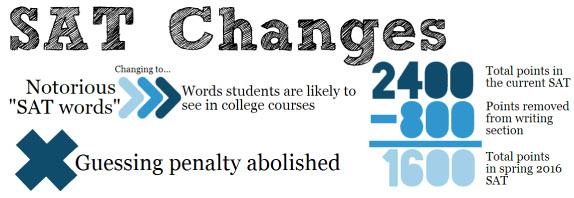SAT format to change drastically in 2016

Abjure, abrogate, adumbrate, anathema. For years, the words have endured in prep books and online Quizlet notecards and have been mainstays on high school vocabulary tests. But the terms may soon fall into disuse with a 2016 update to the SAT, which will include changes to the vocabulary, writing and math sections, as well as an overarching goal to level the playing field.
Specifically, the changes consist of what the College Board calls more everyday vocabulary, an optional analytical essay, and a more narrowly-focused math section, according to the SAT website. Furthermore, the test will be graded on a 1600 point scale.
“They want to make it more in step with the high school curriculum, and more applicable,” Andover Prep SAT Tutor Chris Winkler said.
Additionally, wrong answers will no longer be penalized with point deductions, and test prep will be offered free online through the Khan Academy website.
Some students think the new test will be an improvement. “I’m a little peeved that I have to take the current SAT,” Brittany Braswell ’15, who finds the SAT’s vocabulary words abstruse, said.
Winkler also prefers the new test’s optional essay, which is a text analysis rather than a response to a general question. “The current essay doesn’t encourage the level of complexity that colleges require of students,” Winkler said.
However, other students find the current SAT – esoteric words and all – preferable. “In the end, it’s important to know vocabulary just to be an educated person,” Michelle Gurevich ‘14 said.
Although the overhauled SAT would be offered during present sophomore Jim Zhang’s senior year, he plans to take the current version of it during junior year. “Although the loss of a mandatory essay would have been very attractive to me one year ago, I feel that my English teacher has given me enough prep in essay-writing to allow me an advantage over most kids,” Zhang said.
Student opinion varies, but there is no debate that the changes will affect test prep in and out of the classroom.
“We certainly will adapt things,” Trey Billings, co-founder at Freudigman and Billings test prep service in Westport, said. Billings said F&B’s approach already minimizes vocab instruction, focusing instead on language in context, a skill that will still be useful for the new test.
However, Billings sees the essay as a shift that will affect prep. He said that F&B’s AP Lang curriculum prep may be appliedto the new essay. Although the essay portion will become optional in 2016, Billings feels that colleges will still expect an essay from the demographic of students in Westport. “In practice, it won’t be that optional,” he said.
In the classroom, some teachers said they will tweak prep for the vocab section. “It will probably change my tests a little,” English teacher Cody Thomas said. “Especially with juniors, I choose some words specifically from the SAT list.” Other teachers also pull words straight from the test, but have not focused on changing prep yet for the 2016 overhaul.
Some teachers do not anticipate much change. “My tests will not change tremendously,” said English teacher Kim Herzog. “It’s still important for kids to know vocab and know how to write comprehensively,” she said.
Changes in test material may affect weekly tests in English or the contents of a student’s set of flashcards, but the SAT’s partnership with Khan Academy will affect the fundamental nature of test prep, in order to “make comprehensive, best-in-class SAT prep materials open and free,” according to the Khan Academy website.
Freshman Jay Mudholkar plans to make use of the resource and would feel comfortable using the online site alone as preparation for the SAT. “If the College Board is working with them to make the test, Khan Academy will undoubtedly be the most realistic source of prep,” he said.
Winkler qualified that the shift may have good intentions but will not be a perfect solution. “There will always be ways for students to gain an edge based upon a fortunate socio-economic background,” he said.
Still, many are hopeful that the partnership will level the playing field for students who may not be able to afford tutoring services. “It’s great that they are offering ways for students of every income to get support,” Herzog said.
Billings also noted that the removal of the guessing penalty would help students without access to test prep. “It takes away the mental calculus and games,” he said. He noted that students who do not receive outside prep and come from weaker schools might not know how to optimize their scores with the old method, which subtracted a fourth of a point for wrong answers, while giving zero points for a bubble left blank.
Despite the SAT’s focus on equalizing chances for a perfect score, Billings is unconcerned about business.
“We have a wait list for the class of 2015,” Billings added. “I’m not concerned.”
Winkler, too, was unconcerned, even though most of Andover’s customers come for SAT rather than ACT work. “Most people always want to give their kid the best shot at doing well on the test,” he said. “Certain students thrive in an environment with more guidance.”
Beyond leveling the playing field, Billings and Winkler feel that the changes may be a response to competition with the ACT. “More students are flocking to the ACT because it is theoretically a more straightforward and content-based test,” Winkler said. “That’s why there’s the drive to make the SAT more real-world friendly.”
In the short term, however, the ACT may actually gain popularity. “The paradox is, with the changes, there will be a flight towards the known, and the ACT is a very known entity,” Billings said.
The changes have made Mudholkar give more consideration to the SAT’s rival. “I feel like the College Board is just trying to make the SAT more and more like the ACT,” he said. “Why not just take the ACT in that case?”

Eliza Llewellyn ’14 is driven and well-rounded. Now that it’s her third year on Inklings, she’s ready to take the lead. As web managing editor, Eliza...














































